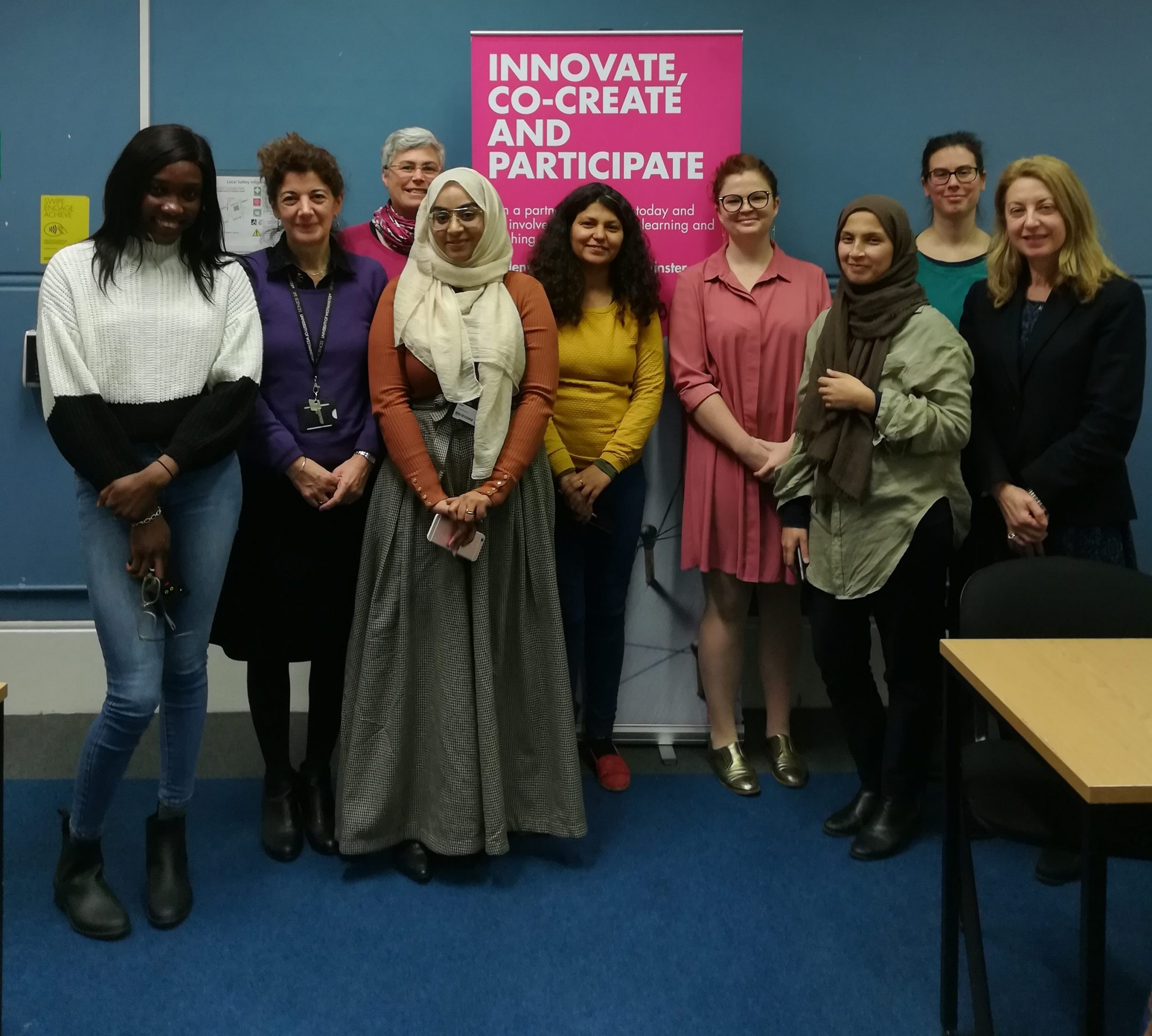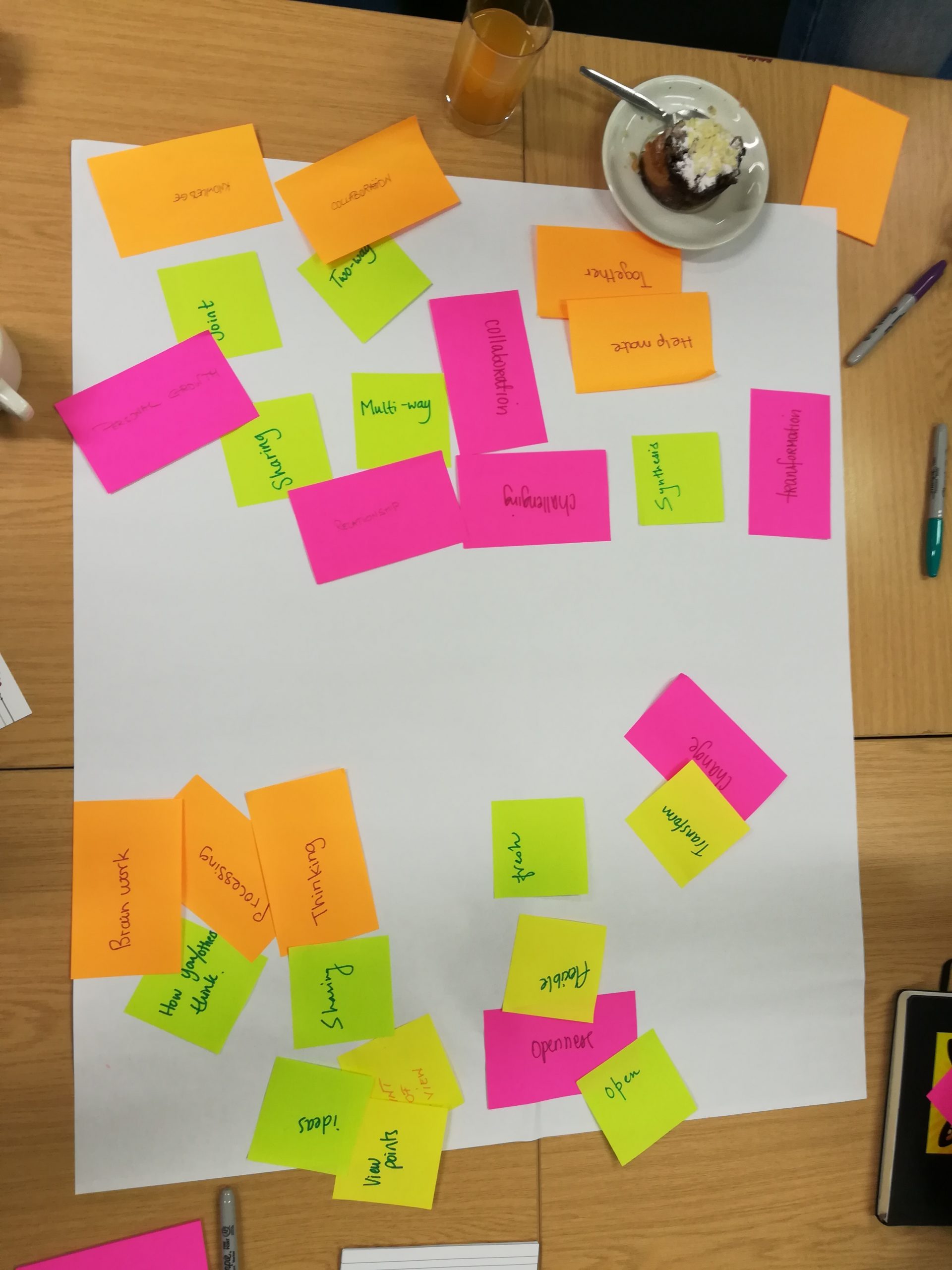Dr. Lucy Mercer-Mapstone facilitated a workshop and discussion on how we can develop an inclusive partnership mindset to use not only in our projects, but also in our personal lives. The workshop was held on Tuesday, 29th of January at University of Westminster, London for the Co- Creators students and staff to meet and learn more about the “partnership mindset as a foundation of practice”. The attendees were taken onboard on a very creative and collaborative process, over some afternoon tea and cake.
As I quickly sneak in the room a couple of minutes after it started, I hear the other collaborators introducing themselves and I join them. Everybody looks relaxed and ready to start an important discussion. Dr. Mercer-Mapstone kicks off on a very high note with the assumption that “involving students as active collaborators in teaching and learning is a good idea”. It’s a simple statement, but we all related and agreed to it and also established that student partnership is rather equitable than equal. We all listen patiently, but soon engage in a discussion about what partnership means to us and I declare that for me it’s a way of gaining not only practical knowledge (interpersonal and research skills or materialistic recognition) but also emotional knowledge (empathy, communicating emotional states, action tendencies).
Our next task was to define the “partnership mindset” and we came up with some pretty interesting concepts. Divided in two groups, each of us had to write down a couple of words for what “partnership” and “mindset” means to us. We would then end up having different definitions, with key words such as “refreshing”or “mindflux”, based on our own views upon reality. Later on, everyone had chosen a random object the facilitator brought, to which we would find out that we need to compare ourselves to: similarities, differences and lesson learnt. This was a funny and reflective exercise as my object seemed to be a plastic toy sombrero, but my colleague recognised it as lime squeezer. In the end, we have all identified certain traits about our own personalities and how we transfer our skills from partnership in time-limited projects to partnership in personal life.
Developing a partnership mindset/ mindflux would mean acknowledging the values and principles we bring (and aim to bring) in our higher education partnership programs and start practicing them at the workplace/ studyplace and in our personal lives. From my opinion, managing to reach such high levels of interconnection in more aspects of our lives would draw very positive outcomes and create harmony. This would not only help us become more successful (in our relationships with other people from any background, in completing work within proposed time scales or standards, and in our consistent learning about ourselves and the world) but also improve our wellbeing.
Our workshop had reached a very creative point when Dr. Mercer-Mapstone would ask us to finalise our partnership mindset statement and we would have to share it with another person. Once we had a different statement in front of us, we had to write a poem. Yep! Exercising our creativity through poems and giving another twist to poetry by mixing it with some partnership mindsets. The poems will be soon released online on the CTI web page to help other people get inspired and why not, try to create their own partnership poem.
We all left the room with the thought of having had a lovely, inspiring and motivating afternoon, with a lot of food for thought and aspiring to introduce the partnership mindset as a foundation of practice in our daily professional and personal lives, thanks to Dr. Lucy Mercer-Mapstone. I would like to show my gratitude to the CTI director of student partnership, Dr. Jennifer Fraser and the Students as Co-Creators Program Coordinator, Moonisah Usman for inviting me to participate in the workshop.
To keep in touch with Dr. Mercer-Mapstone’s work you can follow her on twitter at@LucyMercerMaps. Follow @WestminsterSCC to stay updated with our research projects, events and work with the Westminster Co-Creators.
By Ruxandra Calin
- Partnership mindset outside the student partnership projects and into other aspects of daily life - February 27, 2019
- Co-liberation, anyone? - February 27, 2019
- Student Engagement: Evolution and Future - July 31, 2018


Leave A Comment